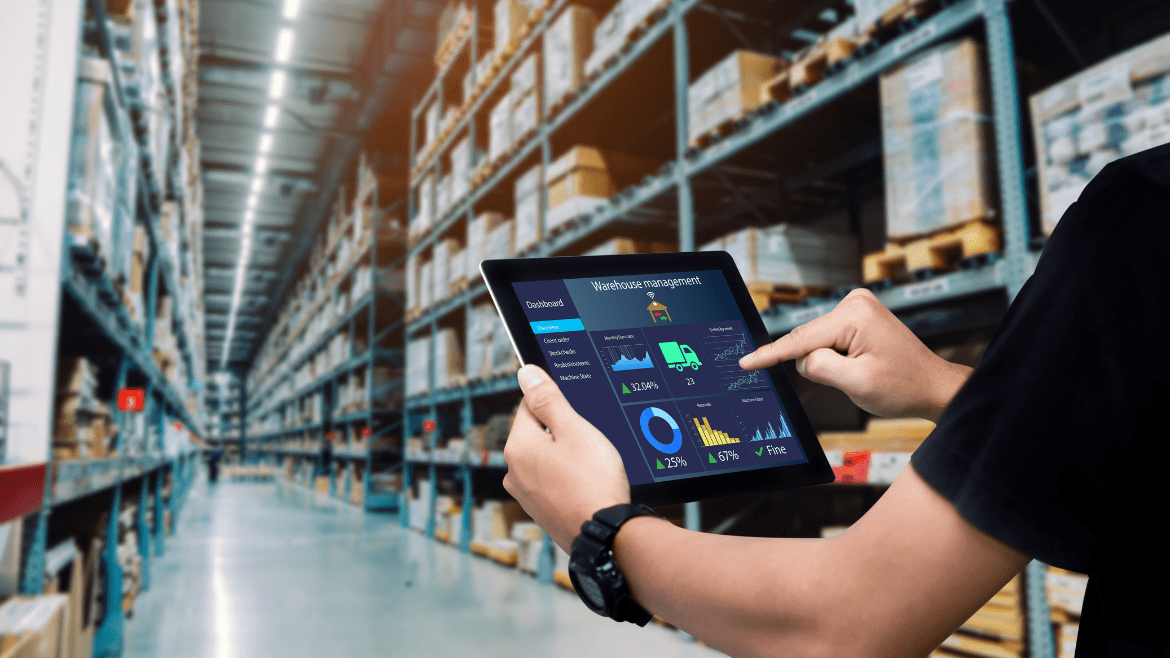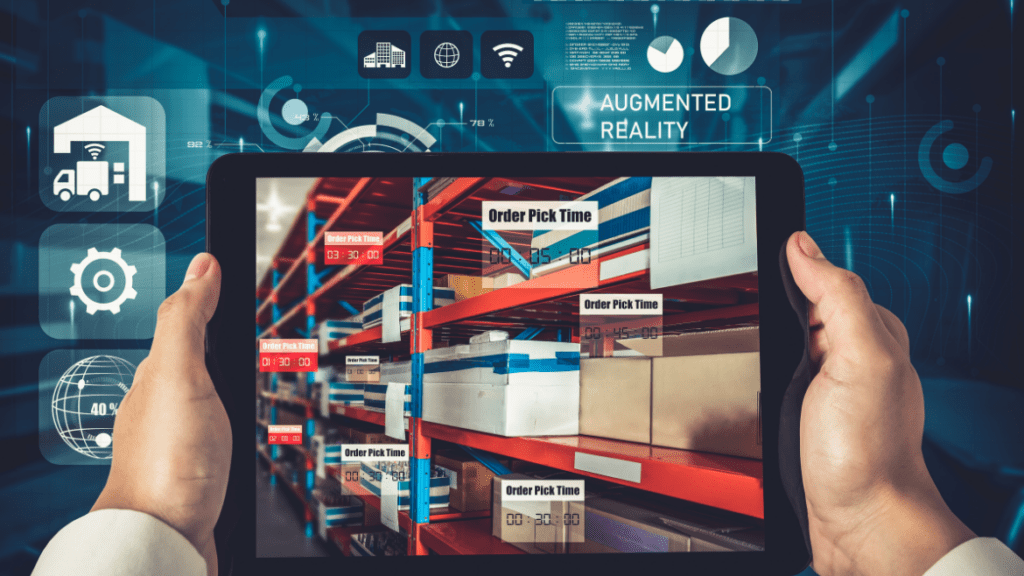In the rapidly evolving world of warehouse management, companies face the challenge of adapting to new technologies and changing consumer needs. In 2024, seven notable trends are shaping the standards for effective warehouse management. These trends are key to optimizing processes, increasing efficiency, and enhancing overall warehouse performance. Let’s take a closer look at these trends.
Top 7 trends in Warehouse Management practices
1. Advanced automation technologies
The integration of advanced automation technologies, such as autonomous vehicles, drones, and automated order picking, will be a top priority for warehouses in 2024. These technologies not only reduce operational costs but also enhance the accuracy and speed of order processing.
2. Autonomous vehicles in the logistics chain
Autonomous vehicles are no longer limited to simple goods movement within warehouse facilities. In 2024, they evolve into advanced transport vehicles adding intelligence to the logistics chain. These vehicles optimize route planning and utilize machine learning to adapt to changing conditions, maximizing efficiency.
3. Drones for fast and accurate inventory
Drones are transforming how warehouses manage their inventory. In 2024, drones are deployed for real-time inventory checks, providing warehouses with an accurate picture of stock levels without the need for manual inspections. This not only saves time but also minimizes errors associated with manual inventory methods.
4. Automated order picking
One of the most remarkable applications of automation is found in automated order picking systems. Robots are deployed to retrieve items and assemble orders with unprecedented speed and precision. This not only accelerates the handling process but also minimizes errors, leading to improved customer satisfaction.
The adoption of these advanced technologies translates into significant benefits for warehouses. Firstly, they result in substantial cost savings as the need for human labor in repetitive tasks decreases. Additionally, process accuracy improves, minimizing errors and delays.
Furthermore, this technological revolution opens new opportunities for warehouses to adapt to changing market needs. Flexibility is enhanced, allowing warehouses to respond faster to demand fluctuations and new product launches.
5. Green initiatives take the stage
In 2024, there’s a notable surge in the adoption of sustainable warehouse practices, as businesses prioritize environmental responsibility alongside operational efficiency. This trend encompasses a range of initiatives aimed at reducing carbon footprints and minimizing ecological impact throughout the supply chain.
One prominent aspect of this shift involves the implementation of renewable energy solutions within warehouse facilities. Solar panels, wind turbines, and other renewable energy sources are increasingly integrated to power warehouse operations, reducing reliance on fossil fuels and lowering overall energy costs.
Additionally, there’s a growing emphasis on waste reduction and recycling initiatives within warehouses. Companies are implementing innovative waste management systems to minimize landfill waste and maximize recycling rates. This includes strategies such as composting organic waste, repurposing packaging materials, and implementing closed-loop recycling systems for pallets and other reusable materials.
Furthermore, sustainable transportation practices are gaining traction in warehouse management. Businesses are investing in electric or hybrid vehicle fleets for intra-warehouse transport, reducing emissions and noise pollution within facility premises. Additionally, there’s a greater focus on optimizing transportation routes to minimize fuel consumption and greenhouse gas emissions in outbound logistics.
6. Real-time inventory management with Internet of Things (IoT)
The Internet of Things (IoT) has firmly established itself in warehouse management in recent years and continues to play an indispensable role in 2024. While real-time monitoring of inventory levels is already widespread, we observe a further evolution and optimization of IoT applications in warehouses.
While real-time monitoring is standard, there is now a shift towards more sophisticated and in-depth analysis of collected data. Advanced algorithms and artificial intelligence are employed to identify trends, predict seasonal influences, and more accurately forecast demand.
This refinement in IoT applications results in significantly improved visibility and control over inventory. Warehouse managers can rely not only on real-time information but also leverage advanced analytics to prevent potential errors and stock shortages. For example, the system can automatically generate alerts when it detects that a particular product is at risk of running out or when irregularities in the stock are observed.
7. Sustainability and environmentally friendly solutions in the warehouse
Sustainability is the driving force behind changes in warehouse operations. As a company, you may be looking for ways to not only save costs but also contribute to a greener future.
- Optimize with customized systems
Consider using customized Warehouse Management Systems (WMS) that not only meet your specific needs but also integrate sustainability. Real-time inventory monitoring, route optimization for energy-efficient transport, and sustainable packaging practices are just a few features that can contribute to a greener warehouse environment. - Reconsider packaging choices
Reusable packaging is not only good for the environment but can also be cost-effective. Consider systems for managing reusable packaging to reduce waste and promote sustainable packaging practices. A small change in your packaging choices can make a big difference. - Integrate sustainable energy sources
If your company is looking to transition to sustainable energy, consider integrating green energy sources into your Enterprise Resource Planning (ERP). For example, solar energy and wind energy can not only reduce your ecological footprint but also contribute to a more sustainable future. - Use data smartly for sustainable decisions
Data analysis is a powerful tool for making sustainable decisions. From minimizing energy consumption to optimizing supply chain routes, use big data and artificial intelligence to leverage real-time insights for a greener future.
Robotics in Warehouse Management
By integrating warehouse robots into your warehouse management, you not only benefit from improved accuracy and speed in order picking but also seamless collaboration with your Warehouse Management System (WMS). These robots work in synergy with the WMS to obtain real-time inventory information, optimize order processing, and automatically update the system. This maximizes efficiency and minimizes errors.
Blockchain for transparent supply chains
Blockchain, as a decentralized ledger system, is changing the rules for data management in warehouses. Instead of a central authority, all participants in the supply chain have equal access to the same data, leading to an unprecedented level of transparency. Warehouses can benefit from real-time visibility into all transactions and movements in the supply chain, eliminating doubts about the origin, storage, and distribution of products.
Augmented Reality (AR) for training and order picking
Traditional onboarding processes can be time-consuming, but AR is changing this game entirely. By using AR glasses, new warehouse employees can receive real-time instructions while navigating through the warehouse and collecting orders. This visual guidance, projected in their field of view, enables quick and effective learning without extensive training periods. This not only results in shorter onboarding times but also increased confidence and performance of employees.
AR also has the potential to make order picking more accurate than ever before. Employees can see products or storage locations directly with visual cues and markings, minimizing errors. The precision of the order picking process increases as AR glasses indicate the correct locations and items to be picked up. This not only leads to more efficient order processing but also a significant reduction in errors and minimization of delays.
Grow with BizBloqs
BizBloqs, as a pioneer in customized Warehouse Management Systems (WMS), understands that progress does not stop at these trends. Our advanced WMS services align perfectly with these innovative trends, allowing warehouses to not only benefit from technological advancements but also achieve fully optimized warehouse management.
With BizBloqs WMS, you are not only prepared for today’s challenges but also building a solid foundation for the future. Discover how our customized WMS solutions can elevate your warehouse to new heights while benefiting from the latest technological developments. Get ready for the future with BizBloqs!










